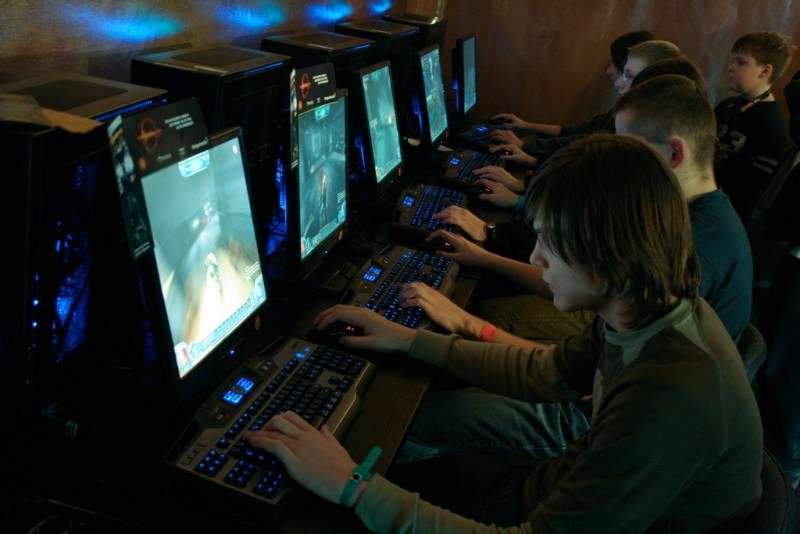Why E-Sports Leagues Shouldn't Drug Test Players
It's a lost opportunity to embrace gaming as a truly virtual competition.

If you've ever spent more than a few minutes playing a competitive online video game—anything from a fast-twitch shooter like Call of Duty to one of those battle arena games like League of Legends that I can just never seem to get into—you've probably gotten the sense that not all of the players you encounter are strictly sober. Pickup games typically let players remain anonymous, so it's impossible to say with certainty, but my entirely unscientific observations suggest that a non-trivial portion of players in online game competitions at any given time are, well, enjoying more than just the game.
The link between video gaming and drugs, especially pot, goes back long before competitive online games arrived, to the early days of arcade and home console gaming. Indeed, I think it's fair to say that a reasonably large number of regular players view gaming primarily as something to do while high. This makes a lot of sense given that games provide a highly engaging but entirely safe virtual playspace to mess around in while chemically enhanced. It's fitting, really: Even the simplest video games are virtual worlds, and these substances can help people enter and inhabit those worlds more fully.
That won't be a possibility much longer, however, for the small but growing number of people who count themselves professional gamers.
The Electronic Sports League (ESL), which hosts competitions for a variety of different competitive games, announced yesterday that it would begin drug testing players starting next month, according to The New York Times. The Times says that the testing regime, operated in conjunction with international agencies that help test athletes in several high profile physical sports, is a reaction to a statement by one player that he was using Adderall. As a result, the league will focus on "performance enhancing drugs." (Technically players were already prohibited from using performance enhancers, but there was no list of banned substances or drug testing in place.)
What the new policy means, exactly, isn't entirely clear yet, but the basic idea, ESL official James Lampkin tells the Times, is "to create a level playing field for all competitors and maintain the integrity of the sport."
One relatively easy way to create a level playing field for competitors is to avoid these sorts of rules entirely, and to take no position on what sorts of substances players consume prior to entering competitions. As for the "integrity" of the "sport," which strikes me as at least a slightly funny thing to say about relatively recent and constantly evolving games like Call of Duty or Counter-Strike (for the record, I've played both, but I much prefer the Battlefield franchise), it seems to me that the most integral thing is how and how well the players play the game, not the chemical composition of what they consumed beforehand.
It's not entirely clear how the league will enforce these rules. As the Times points out, lots of "preliminary e-sports competitions are held online, with players scattered around the country and abroad," meaning that there's no one around to police behavior. In addition, some of the players are going to have medical prescriptions for drugs like Adderall; a league could make exceptions for them, but that might just end up with large numbers of gamers reporting symptoms that lead their doctors to issue prescriptions.
There's also some question about whether so-called "performance enhancing" drugs actually enhance performance. The player whose admission of Adderall use during a losing streak sparked the testing announcement didn't start winning, told the Times that the drug does not provide an instant boost, and while it helps with some parts of the shooter he plays—the target spotting and shooting bits—it also makes it harder to take directions, and thus to coordinate with fellow team members.
Gaming leagues are obviously totally within their rights to institute whatever rules and conditions they want for participants, and to enforce them however they choose. ESL likely views this move as an opportunity to enhance its credibility and seriousness as e-sports continue to grow, and it may be that policies like this are inevitable as competitive video game playing becomes a massively lucrative global industry.
I don't think this will have much impact on how people play games at home; you'll continue to find chemically enhanced players on your favorite servers, just as you find local sports leagues that resemble beer-drinking clubs as much as actual athletic teams.
But one of the greatest things about e-sports is that they are virtual, not physical; they are not primarily designed to test an individual body's strength or endurance or speed. They exist and occur in the digital realm, apart from the one that our bodies inhabit. They are not bound by place, or by the player's physical characteristics. That's a big part of their appeal, and an important part of what sets them apart from traditional sports.
Drug testing has the potential to change that, in part because it places an emphasis on the physical player, and in part because it may force pro-gaming to become far more bound by place. Lampkin, the ESL official, indicated to the Times that "the whole industry may have to switch from online competitions to predominately live, in-person games."
That's why this feels to me like a bit of a lost opportunity to step beyond the pieties that have long dominated traditional athletics, to set e-sports culturally apart from their physical sport counterparts, and to define the world of competitive gaming as one that accepts and embraces the idea that, unlike traditional athletics, competitive video game playing is about performance in a virtual space rather than about someone's physical attributes.


Show Comments (46)